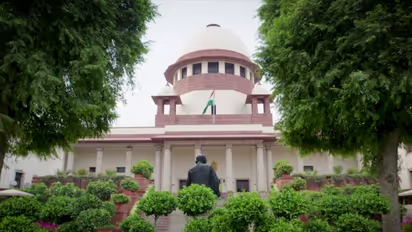Ensures justice for married Muslim women: Centre files affidavit defending Triple Talaq criminalization in SC

Synopsis
In its affidavit, the government stressed that the law aligns with the broader constitutional goals of gender justice and equality, asserting that it supports the fundamental rights of married Muslim women. The law aims to address gender discrimination and empower these women, ensuring their rights are upheld.
The Central government on Monday (August 19) filed an affidavit in the Supreme Court defending the 2019 law criminalising the practice of Triple Talaq. This practice, historically used in Islam to allow a Muslim man to divorce his wife by pronouncing "Talaq" three times, was deemed unconstitutional by Parliament and criminalised starting August 1, 2019.
In its affidavit, the government stressed that the law aligns with the broader constitutional goals of gender justice and equality, asserting that it supports the fundamental rights of married Muslim women. The law aims to address gender discrimination and empower these women, ensuring their rights are upheld.
Elephant set on fire in Bengal: Public demands justice, strong action against offenders (WATCH)
The affidavit was filed in response to a petition challenging the criminalisation of Triple Talaq. The petitioners, including Samastha Kerala Jamiathul Ulema, argue that since the Supreme Court had already declared the practice invalid in 2017, it should not be further criminalized. They contend that criminalising Triple Talaq violates fundamental rights related to equality before the law and freedom from religious discrimination.
The Modi government countered these claims by stating that the Supreme Court's 2017 ruling, which deemed instant Triple Talaq (Talaq-e-Biddat) unconstitutional, did not effectively deter the practice. According to the affidavit, the practice continued despite the court's decision, highlighting the necessity for a criminal statute to enforce the ban.
The government's affidavit further described the impact of Triple Talaq on Muslim women, labelling it as detrimental to the institution of marriage and leaving many women in a "pathetic" condition. The affidavit underscored that without punitive measures, victims of Triple Talaq had no legal recourse, as the police were powerless to act in the absence of specific legal provisions.
Uttarakhand HORROR! Teenager gangraped in bus at Dehradun ISBT, drivers among 5 arrested
According to the government, the law was introduced to provide a remedy for victims and prevent the ongoing misuse of Triple Talaq, ensuring that women have legal protection and recourse.
Stay updated with the Breaking News Today and Latest News from across India and around the world. Get real-time updates, in-depth analysis, and comprehensive coverage of India News, World News, Indian Defence News, Kerala News, and Karnataka News. From politics to current affairs, follow every major story as it unfolds. Get real-time updates from IMD on major cities weather forecasts, including Rain alerts, Cyclone warnings, and temperature trends. Download the Asianet News Official App from the Android Play Store and iPhone App Store for accurate and timely news updates anytime, anywhere.